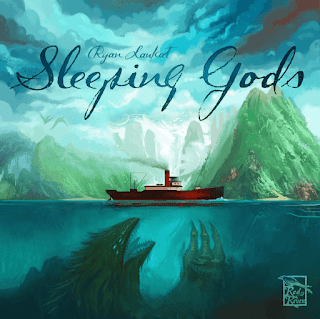Sleeping Gods - An Introduction
Game Specs
- Advertised Player Count: 1-4
- *Actual* Player Count: While this game can be played solo, I think it's much more interesting with 2-4. There are limitations that come with 2-4 players that can create obstacles not seen in a solo game, but since it's so story-oriented, I find it more fun to share the story and decision points with other players. But I do think it's satisfying to play as a "Choose Your Own Adventure" solo and uncover things by yourself!
- Playing Time: 60-1200 minutes.
- That's right, y'all - it's an ongoing campaign game and so you can decide how long you play in each sitting. Unlike a lot of other campaign games, though, I really appreciate that you really can pause this game at nearly any point. This isn't true in the other campaign games I've played because one really needs to wrap up a mission or a quest before pausing the game. In Sleeping Gods, the game can be paused and put away after literally any encounter.
- Age: 13+
- Premise: Travelers on the steamship "Manticore" find themselves in another realm and must explore the realm in order to return home. It's a co-op storytelling game that also uses an atlas.
Hey look! I took my own picture of my own game for once!
Okay y'all: I really enjoy my campaign games. When I learned about this one, I pre-ordered it because it sounded different to me. And in my opinion, it very much is. That said, I wrote a little bit about it in a previous recap post here. In case you didn't read it, we basically played through the tutorial and then stopped because it seemed as though there'd be a ton of narration. As in there'd be more narration and reading and story than actual gameplay. So we didn't really get into the game itself. I always knew I'd want to return to it, but finally decided that I didn't want to wait until more people were available and their schedules jived with mine. So I put it on the table to start a campaign by myself.
Now, in case you don't know, you can only keep one campaign saved at a time. I'm sure you *can* save multiple campaigns, but not without really extensive book-keeping and some spoiling of what's coming next. So if I end up playing this game with other people before I finish a campaign on my own, I'll be wrapping up my own campaign prematurely. So just know that you can't juggle multiple campaigns of this simultaneously (which is just as well, because that feels like a bad choice to me if you're really invested in the story experience).
I set the game up for myself and sort of prepared myself for a lot of reading and exposition and learned that assessment honestly couldn't be less accurate. So far, I've played 9 or 10 turns in this campaign and the narrative is tight! I feel as though it really shares a story but I do not at all feel railroaded into the story, which I really appreciate! I wasn't so sure after the tutorial, but of course, the tutorial is designed to teach us the rules. So there's a different structure utilized in the tutorial than the structure that centers the game itself. The gameplay is fun and straightforward and I really enjoy the exploration of a fairly open world.
Also, it can feel kind of overwhelming when reading through the rulebook. At least, it kind of did for me, just in terms of trying to remember how to do everything. But honestly, the game is simpler than I think the rule book feels. There are some interactions that are worth checking in the book when one starts to play the game, for sure. And it's really helpful to read the strategic tips in the back of the rulebook because it can be extremely appealing to commit a lot of crew members to challenges in order to ensure success. But it's not a strategy one can maintain in the long-term and while that may seem obvious to some, it isn't obvious to all. It's worth repeating a clarification they make, which is that failing an Encounter check doesn't necessarily mean one doesn't reap the benefits of the the encounter! It just means one definitely incurs a penalty. It's one of those instances in which I feel as though the rule runs a little contrary to my expectation of what will happen upon failing a challenge.
Bottom Line: I think what I like most about this game are the things I like about T.I.M.E. Stories: playing through an unfolding narrative and solving quests and side quests. But I think Sleeping Gods accomplishes these aims through different, and ultimately superior, means. In Sleeping Gods, I feel like I have much more agency and I also feel as though I'm handed the tools to succeed. I do need to keep some information in my head, but so far, I haven't experienced any crippling red herrings. Plus, the game encourages light documentation as we go. It just feels like there's far more to explore here without constantly feeling the stress of "but if we explore that and it's not useful at all, we've wasted so much time!" I have nearly spent more time having those debates while playing T.I.M.E. Stories than actually playing the game! Ok, not quite. But I do often remember those debates better than the actual game! I am happy to indulge my wanderlust in Sleeping Gods while still feeling as though there's a worthwhile reason to do so. I think it's an enjoyable and unique storytelling game that lets you put it down and pick it up again at any time. And the artwork is cool too!



Comments
Post a Comment